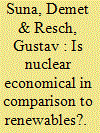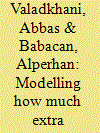|
|
|
Sort Order |
|
|
|
Items / Page
|
|
|
|
|
|
|
| Srl | Item |
| 1 |
ID:
124551


|
|
|
|
|
| Publication |
2013.
|
| Summary/Abstract |
This paper addresses the relationship between bank competition and efficiency by computing Lerner indices and cost efficiency scores for a sample of Chinese banks over the period 2002-2011. Granger-causality tests are performed in a dynamic GMM panel estimator framework to evaluate the sign and direction of causality between them. We observe no increase in bank competition over the period, even as cost efficiency improves. In a departure from the empirical literature showing that competition negatively Granger-causes cost efficiency for Western banks, we find no significant relation between competition and efficiency. This suggests that measures to increase bank competition in the Chinese context are not detrimental to efficiency.
|
|
|
|
|
|
|
|
|
|
|
|
|
|
|
|
| 2 |
ID:
149902


|
|
|
|
|
| Summary/Abstract |
The European Union is divided on the issue of electricity production. While there is consensus that generation technologies need to be low on greenhouse gas emissions, the question of whether to use renewables or nuclear to meet this power demand is highly controversial. Both options still require financial support and this is not going to change in the near future. This raises the question of where public money should be invested in order to achieve greater economic efficiency: into support for renewable energies (RE) or support for nuclear power plants?
|
|
|
|
|
|
|
|
|
|
|
|
|
|
|
|
| 3 |
ID:
132653


|
|
|
|
|
| Publication |
2014.
|
| Summary/Abstract |
Gross profitability margin (difference between retail and wholesale prices) for unleaded petrol exhibits substantial variations across 108 cities, towns and regional centres in Australia. This paper examines if such variations (averaged during 2007-2012) can be explained by (a) transport costs proxied by the distance between retailers and wholesalers; (b) the size of the retail market; (c) market competition proxied by the number of cars in the vicinity of the retailers; (d) dummy variables capturing other qualitative attributes associated with the retailers' locations. Three cross-sectional regressions are estimated but only one successfully passes all diagnostic tests. By identifying a number of locations exhibiting excessive profit margins, the results of this paper enhance the efficiency and transparency of petrol pricing in the retail market. It is found that the extent of excessive profiteering in Western Australia (WA) and South Australia (SA) were lower than other Australian states and territories. This important finding can be explained by a strong presence of independent petrol stations in SA and the successful price-monitoring performance of FuelWatch in WA.
|
|
|
|
|
|
|
|
|
|
|
|
|
|
|
|
| 4 |
ID:
132681


|
|
|
|
|
| Publication |
2014.
|
| Summary/Abstract |
Economists traditionally view a Pigouvian fee on carbon dioxide and other greenhouse gas emissions, either via carbon taxes or emissions caps and permit trading ("cap-and-trade"), as the economically optimal or "first-best" policy to address climate change-related externalities. Yet several political economy factors can severely constrain the implementation of these carbon pricing policies, including opposition of industrial sectors with a concentration of assets that would lose considerable value under such policies; the collective action nature of climate mitigation efforts; principal agent failures; and a low willingness-to-pay for climate mitigation by citizens. Real-world implementations of carbon pricing policies can thus fall short of the economically optimal outcomes envisioned in theory. Consistent with the general theory of the second-best, the presence of binding political economy constraints opens a significant "opportunity space" for the design of creative climate policy instruments with superior political feasibility, economic efficiency, and environmental efficacy relative to the constrained implementation of carbon pricing policies. This paper presents theoretical political economy frameworks relevant to climate policy design and provides corroborating evidence from the United States context. It concludes with a series of implications for climate policy making and argues for the creative pursuit of a mix of second-best policy instruments.
|
|
|
|
|
|
|
|
|
|
|
|
|
|
|
|
| 5 |
ID:
163537


|
|
|
|
|
| Summary/Abstract |
This paper reviews the existing approaches to allocate natural gas network costs at an international level, comparing them to the conceptual framework based on the regulatory principles to be followed according to Economic theory.
|
|
|
|
|
|
|
|
|
|
|
|
|
|
|
|
| 6 |
ID:
127200


|
|
|
|
|
| Publication |
2014.
|
| Summary/Abstract |
In order to evaluate the alternative technologies for producing hydrogen in Korea stage by stage, we searched for impact factors, calculated the weights of them and evaluated the hydrogen production technologies in Korea using analytic hierarchy process (AHP) approach. The AHP is a useful method for resolving multi-criteria decision making problems. We investigated 4 criteria (technical characteristics, economic efficiency, marketability, internal capability) and 11 sub-criteria (scale, efficiency, key barriers, carbon dioxide reduction, current production cost, expected production cost in 2017, feed-stock, technical maturity, R&D competitive level, technology gap with competing agencies, and domestic infrastructure). And the alternatives are natural gas reforming technology, coal gasification technology, biomass gasification technology, water electrolysis technology, thermochemical production technology, photoelectrochemical hydrogen production technology, and biological hydrogen production technology. In order to maintain the objectivity of the analysis result and observe the difference among the groups, the questionnaire survey targets were divided into the R&D professional group and policy professional group. This result of study is expected to serve as important basic information in the establishment of a national R&D strategy to prepare for the imminent hydrogen economy era.
|
|
|
|
|
|
|
|
|
|
|
|
|
|
|
|
|
|
|
|
|